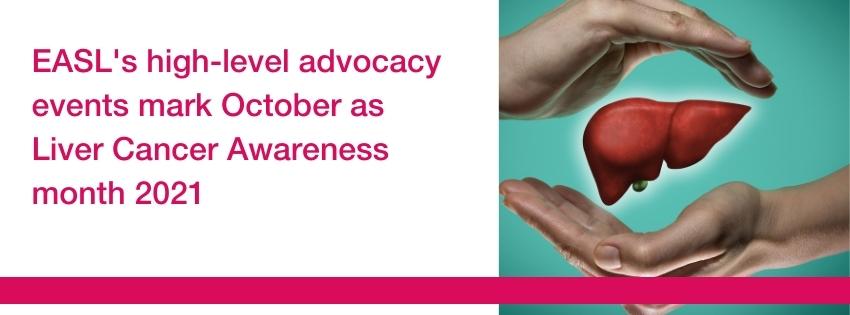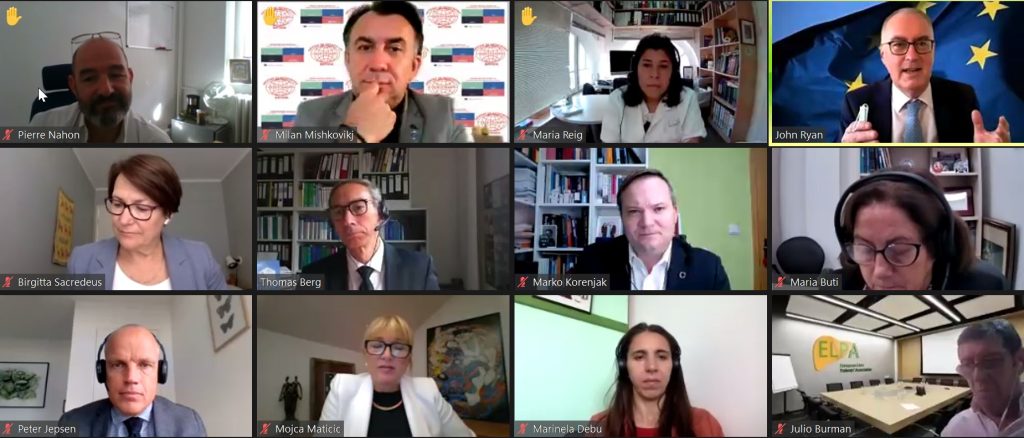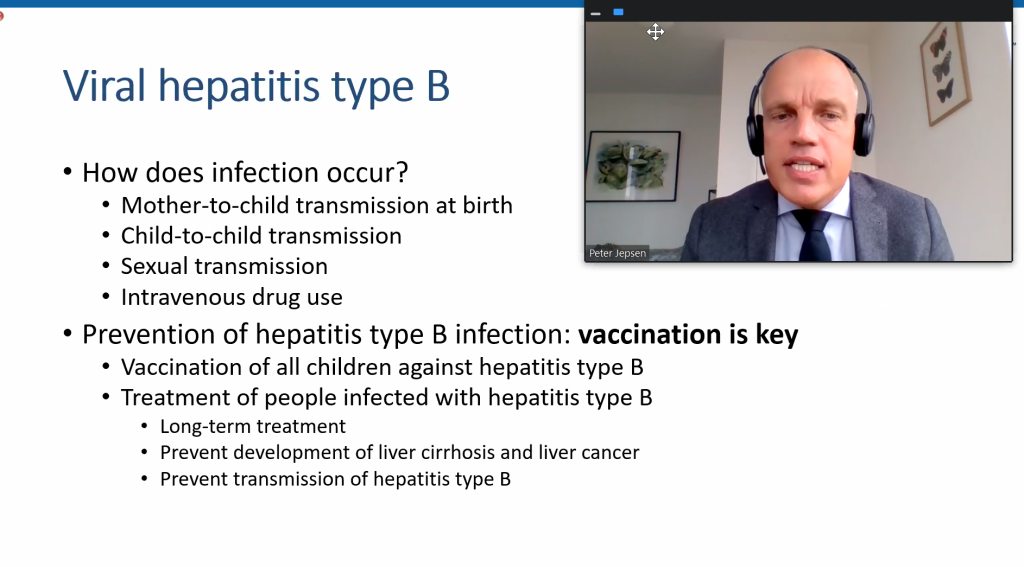Engaging high-level advocacy activities mark October as Liver Cancer Awareness month

9 November 2021
With October being a month dedicated to promoting liver cancer awareness, EASL participated in numerous relevant activities. EASL leadership played a key role notably in two high-level advocacy events, coming to the heart of advocacy. The European Commission’s “Beating Cancer Plan”, launched in February 2021, set the stage for progress Europe-wide in cancer prevention, early detection, and screening, and is catalysing discussions among all stakeholders, including EU policymakers, patient representatives, and healthcare professionals.
Beating liver cancer in Europe – the empowerment of prevention and early detection
On 22 October 2021, EASL held this event under the patronage of the Slovenian presidency of the Council of the European Union and jointly organised it with the European Liver Patients’ Association (ELPA), a member of our Patient Synergies network of umbrella patient organisations. Registered participants numbered 250.
The goals of holding this exchange included: outlining and emphasising the most urgently needed actions to tackle the multifaceted issue of liver cancer and raising awareness about the feasible opportunities to significantly reduce this health burden by better addressing risk factors. The most crucial risk factors being viral hepatitis B and C, alcohol us and, or fatty liver disease.
High-level policymakers showcased their views on how policy can be leveraged to mitigate liver cancer. Distinguished speakers include Igor Zorčič, President of the Slovenian Parliament, who stated that Slovenia’s work around targeted screening for liver cancer sets a good example for the EU. Janez Poklukar, Slovenian Minister of Health, underlined the importance scientific evidence proving that goals for cancer screening in Europe should be raised. John F. Ryan, Director of Public Health Country Knowledge and Crisis Management, DG SANTE, provided further key insights on the European Commission’s actions to tackle cancer in Europe.
Key conclusions: rolling out screening and implementing programmes
In our summary report, EASL drew these two key conclusions:
- Speakers emphasised that the updated Council Recommendation must include liver cancer screening, in line with the World Health Organization’s broader recommendations for cancer screening programmes in Europe. Liver cancer is not only a grave public health concern, but well suited to screening, as a preventative measure. Both suitable, affordable screening tests and effective treatment are already available, so public health outcomes will certainly improve when diagnosis happens early. Suitable programmes to carry this out are urgently needed.
- Programmes to monitor patients can increase early detection of liver cancer and targeted surveillance programmes of at-risk patients must be implemented systematically. Education programmes of both patients and their healthcare providers will be key to successful implementation.
Session 1. Liver cancer: prevention and health promotion
Session 2. Liver cancer: early detection and screening
Opportunities for hepatitis-related cancer prevention in Europe’s Beating Cancer Plan
On 28 October 2021, this event was held, jointly organised by EASL and the Association Collaborating on Hepatitis to Immunize and Eliminate the Viruses in Europe (ACHIEVE), with the support of the European Cancer Patient Coalition (ECPC). Both EASL and ACHIEVE are members of the ECPC’s Cancer Complications and Comorbidities Initiative.
Through this event, we aimed to situated awareness raising about liver cancer in the context of discussion with EU policymakers, relating to cancer prevention initiatives already mentioned in the Beating Cancer Plan. (Such initiatives include the European Code Against Cancer, EU Mobile App for Cancer Prevention, initiatives targeted at vulnerable populations, the planned Council Recommendation on vaccine preventable cancers, among others.)
High-level speakers included Members of Parliament (MEPs): Prof. Romana Jerković; Radan Kanev; and Aldo Patricelli. MEPs subsequently received a report detailing the event published by Dods Monitoring.
Watch this event on demand
Insights from leadership
Aldo Patriciello MEP, Co-Chair of the Challenge Cancer Intergroup and BECA member, highlighted in his opening remarks:
Scientists from the international Agency for Research on Cancer have pointed out that tackling viral hepatitis B and C is essential to significantly prevent cancer and reduce its burden, which is significant also for European countries. My amendments to the draft BECA report “Strengthening Europe’s report in the fight against cancer” thus aim to ensure that we make full use of the tools available in Europe’s Beating Cancer Plan to prevent hepatitis-related liver cancer, including adding liver cancer to the list of recommended screening programmes.
Prof. Peter Jepsen, EASL Policy and Public Health Committee member, called on policymakers to kill “two birds with one stone”: eliminate viral hepatitis types B and C while simultaneously eliminating risk factors for liver cirrhosis and cancer.
Over the past two decades, there has been a 70% increase in liver cancer-related mortality in the European region and clear evidence that viral hepatitis types B and C cause liver cirrhosis and liver cancer. As much as 80-90% of patients with liver cancer have underlying chronic liver disease: liver cirrhosis, effectively acting as a steppingstone towards liver cancer.
Prof. Maria Buti, EU Policy Councillor and Chair of EASL’s Policy and Public Health Committee, highlighted:
Chronic hepatitis B (HBV) and C (HCV) infections are often asymptomatic until late stages. As much as two-thirds of adults with HBV and one third with HCV are simply unaware of their condition. To eliminate or manage these viral infections by 2030, the WHO goal, we must improve prevention, screening, and linkage to care targets.
Prof. Buti emphasised that the tools and instruments needed to achieve these goals are already available, so reducing the risk of liver cancer will follow on automatically from implementing prevention programmes. For HBV, we need to vaccinate and treat people. For HCV, we need to screen and treat people.
How does liver cancer link to the Beating Cancer Plan?
The European Commission’s “Beating Cancer Plan”, launched in February 2021, recognises the importance of identifying and addressing the main risk factors in liver cancer, such as raising awareness about obesity, harmful alcohol consumption, limiting the marketing of sugary food items.
However, for people who already have liver damage, liver cancer screening and early diagnosis are fundamental to reducing liver cancer–related mortality. EASL urges that targeted cancer screening include additional cancers, including as liver cancer, be considered in the new EU-supported Cancer Screening Scheme.
More links
Find out more about EASL’s EU Affairs and Advocacy activities
Read more about EASL’s Policy and Public Health Committee




